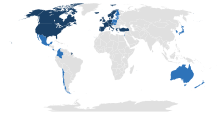Spain sits near the bottom of OECD rankings on adult literacy and numeracy
Thursday, October 10, 2013

Image: Canuckguy and Emuzesto.
Tuesday, the Organisation for Economic Co-operation and Development (OECD), a 34 member international economic organization founded in 1961 that traces its origins back to the World War II-era Marshall Plan, published results on the state of adult skills in 24 countries, most of them European. Spain finished near the bottom of all surveyed countries when it came to adult literacy and numeracy.
Internationally, Spain ranks second to last amongst surveyed countries for literacy proficiency amongst adults. Only Italy has a lower literacy proficiency amongst adults. Spain, at 20.3%, has one of the highest percentages of their population at reading proficiency level 1. This means adults have a basic understanding of what they read, can fill out forms, and can understand the meaning of sentences. When below level 1 is added, the total comes to 27.5% of the population at the lowest reading proficiency level. Overall, Spain's mean reading proficiency score puts them on par with Italy. Amongst young adults aged 16 to 24 years, Spain ranks second to last amongst surveyed countries, with a mean score comparable to Italy, England, and Northern Ireland, and Cyprus.
Spain ranks last amongst all surveyed countries in numeracy proficiency amongst adults aged 16 to 65 years. The country's mean score is comparable to Italy. When only 16 to 24 year-olds are included, Spain's overall relative performance increases by two spots, as a result of beating out Italy and the United States. The performance of this age group is comparable to Ireland, Italy, England and Northern Ireland. Individual performance on numeracy and literacy correlates highly in Spain at 0.887.
The percentage of adults who have completed university in Spain is slightly under the global average for people aged 25 to 34 years, and significantly below average for people aged 55 to 65 years. Spain finishes near the bottom of surveyed countries based on reading skills required at work. Only the Czech Republic, Slovakia, Poland, and Italy require less use of reading skills at work.
In 2010, roughly 50% of people in Spain had access to the Internet. From 2005 to 2010, there was an increase from around 25% to around 35% in the number of individuals using the Internet to interact with government in Spain. In the same period, business interaction with governments in Spain increased from about 55% to about 65%. Spain's percentage of foreign-born residents rose from around 3% in 1995 to about 14% in 2009.
The results are based on a survey of 166,000 adults from Australia, Austria, Flanders, Canada, the Czech Republic, Denmark, Estonia, Finland, France, Germany, Ireland, Italy, Japan, South Korea, the Netherlands, Norway, Poland, Slovakia, Spain, Sweden, England, Northern Ireland, the United States, Cyprus, and Russia. They survey was conducted from August 2011 to March 2012, with the exceptions of Canada where data was colected from November 2011 to June 2012, and France from September to November 2012.
Sources
- "OECD Skills Outlook 2013, First results from the survey of adult skills" — Organisation for Economic Co-operation and Development, October 8, 2013
- "History of the OECD" — Organisation for Economic Co-operation and Development, October 8, 2013 (date of access)
